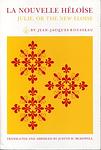Jean-Jacques Rousseau
Jean-Jacques Rousseau was a prominent philosopher, writer, and composer of the 18th century. Born on June 28, 1712, in Geneva, Switzerland, he is best known for his influential works on political philosophy, such as 'The Social Contract,' and for his novel 'Émile, or On Education,' which presents his views on education and the natural goodness of man. Rousseau's ideas contributed to the development of modern political, sociological, and educational thought, and he is considered one of the key figures of the Enlightenment era. He died on July 2, 1778, in Ermenonville, France.
Books
This list of books are ONLY the books that have been ranked on the lists that are aggregated on this site. This is not a comprehensive list of all books by this author.
-
1. The Confessions of Jean-Jacques Rousseau
"The Confessions of Jean-Jacques Rousseau" is an autobiographical work by a prominent philosopher of the Enlightenment era, who candidly shares his life story, from his humble beginnings in Geneva to his later years in exile. The book delves into his personal struggles, his intellectual journey, and his relationships, all while exploring his philosophical ideas on education, politics, and morality. The author's introspective narrative provides a unique perspective on his life and times, making it a seminal work in the history of autobiography.
-
2. The Social Contract
"The Social Contract" is a philosophical work that discusses the concepts of sovereignty and the social contract. The author argues that all men are born free, but everywhere they are in chains, suggesting that society and its rules are a form of enslavement. However, he also posits that a social contract, where individuals come together to form a collective or a society, is necessary for the preservation of their freedom. This contract allows for the creation of a sovereign that is made up of the collective and expresses the general will, which is always right and tends towards the public utility.
-
3. Émile
The book in question is a seminal work in the field of education and philosophy, presenting a comprehensive treatise on the nature of man and the importance of education tailored to the individual's developmental stages. The author argues for a system of education that allows for the natural development of a child's abilities and senses, advocating for learning through experience rather than traditional academic instruction. The narrative follows the growth of a fictional boy, illustrating the author's educational philosophy through his upbringing, which emphasizes moral and emotional development alongside intellectual growth. The work challenges conventional notions of education and has had a profound impact on modern educational theory.
-
4. La Nouvelle Héloïse
The book is a romantic epistolary novel that explores the passionate and tumultuous relationship between a young noblewoman and her tutor. Set against the backdrop of 18th-century France, the narrative unfolds through letters that reveal the protagonists' innermost thoughts and feelings. Their love, fraught with social inequalities and moral dilemmas, challenges the conventions of their time. The novel delves into themes of nature, emotion, and the conflicts between societal expectations and personal desires, ultimately questioning the possibility of true happiness within the constraints of society.
-
5. Julie, or the New Heloise
This novel follows the story of a passionate and forbidden love affair between Julie, a virtuous and married woman, and Saint-Preux, her tutor. Set in the mid-eighteenth century, it explores the complexities of romantic love and societal norms, and the tragic consequences that often follow from violating these norms. The novel is known for its exploration of the nature of love and the conflicting duties of love, honor, and social responsibility.
-
6. Reveries of a Solitary Walker
"Reveries of a Solitary Walker" is a collection of ten meditations, written as the author walks around Paris and reflects on his life. The book, written during the last years of his life, explores his feelings of isolation and detachment from a society he feels has rejected him. It delves into his thoughts on personal identity, his love for solitude, and his belief in the purity of nature. The author also reflects on his past works, his own personal tragedies, and the injustices he feels have been done to him.





